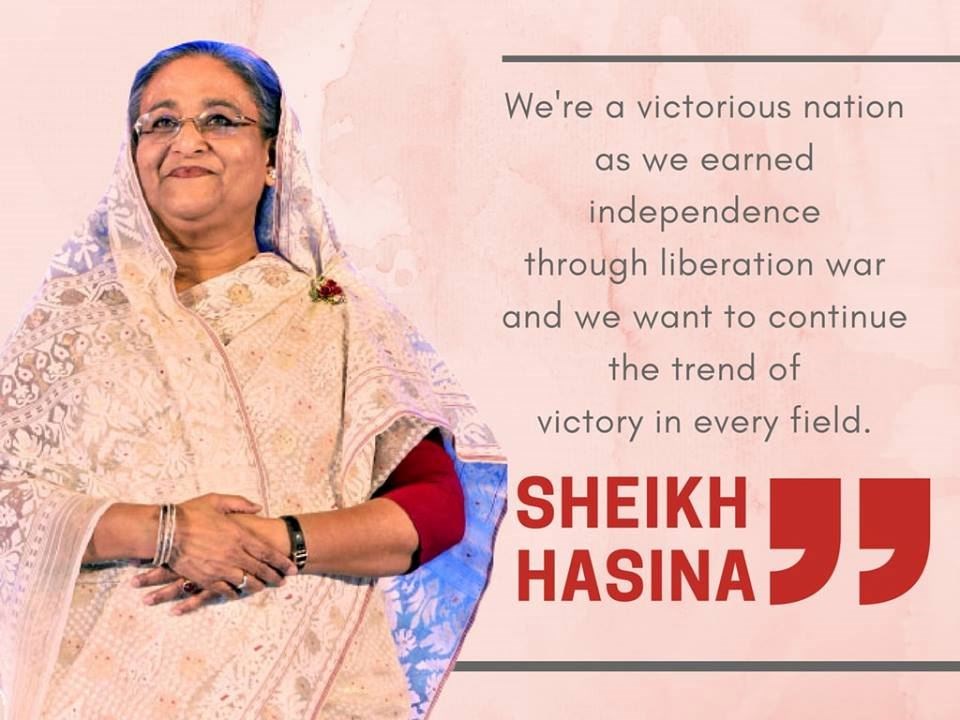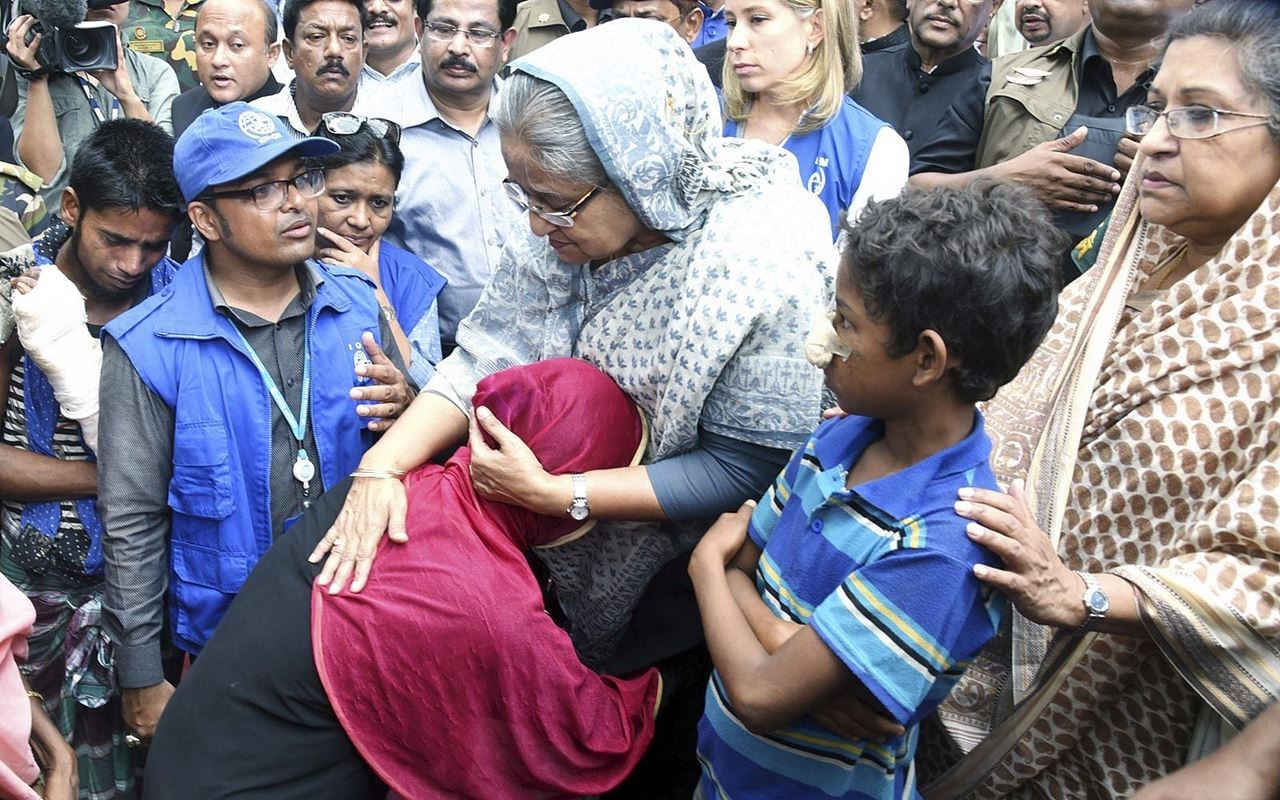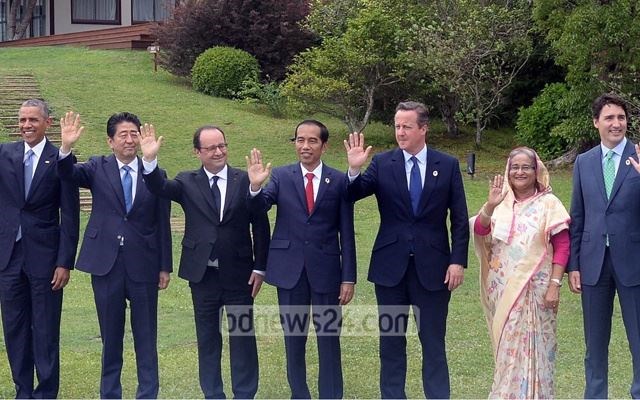 A quote by Sheikh Hasinatwitter.comA young girl, out of the country and away from home, received news that a group of murderous military officers broke into her home and brutally assassinated her father, mother, three brothers, uncles, two sister-in-laws, and cousins (Hasina, Sheikh). Realizing that her country was without a leader after her father was murdered, Sheikh Hasina grasped the idea that it was her responsibility to take over the job as prime minister of Bangladesh and achieve the goal to restore the democracy (Hasina, Sheikh). However, Hasina’s country was under the rule of Khaleda Zia, her family’s adversary. Because of this, she was forced into exile (Bobic). After she returned home to Bangladesh in 1981, she took responsibility of inheriting the Awami League, which urges Bangladesh to become an Islamic state like Pakistan (Bobic). In 1986, she became the leader of the parliamentary opposition where she advocated for basic human rights and moved to cease the violent and inordinate military rule of Bangladesh (“Hasina Wazed, Sheikh”). She became prime minister of Bangladesh on June 23, 1996 (“Hasina Wajed”). Although having been arrested multiple times for her active participation in boycotts of the parliament and the resistance of Hussain Muhammad Ershad’s violent authority, Sheikh Hasina continues to play her role as Bangladesh’s hero by passionately fighting for what she believes would not only benefit her, but the people of the country (Bobic). A hero is someone who does not desire to change the world to be recognized but to passionately inspire a change to help spread selflessness and kindness. Also, a hero is someone who is motivated and determined to do whatever it takes to stop any suffering or adversity, even if it is inevitable. Despite her disturbing and unresolved past before her reign as prime minister of Bangladesh and leader of the Awami League, Sheikh Hasina demands to change the fate of war-torn and broken Bangladesh by caring for everyone and passionately advocating for more peaceful and righteous streets.
A quote by Sheikh Hasinatwitter.comA young girl, out of the country and away from home, received news that a group of murderous military officers broke into her home and brutally assassinated her father, mother, three brothers, uncles, two sister-in-laws, and cousins (Hasina, Sheikh). Realizing that her country was without a leader after her father was murdered, Sheikh Hasina grasped the idea that it was her responsibility to take over the job as prime minister of Bangladesh and achieve the goal to restore the democracy (Hasina, Sheikh). However, Hasina’s country was under the rule of Khaleda Zia, her family’s adversary. Because of this, she was forced into exile (Bobic). After she returned home to Bangladesh in 1981, she took responsibility of inheriting the Awami League, which urges Bangladesh to become an Islamic state like Pakistan (Bobic). In 1986, she became the leader of the parliamentary opposition where she advocated for basic human rights and moved to cease the violent and inordinate military rule of Bangladesh (“Hasina Wazed, Sheikh”). She became prime minister of Bangladesh on June 23, 1996 (“Hasina Wajed”). Although having been arrested multiple times for her active participation in boycotts of the parliament and the resistance of Hussain Muhammad Ershad’s violent authority, Sheikh Hasina continues to play her role as Bangladesh’s hero by passionately fighting for what she believes would not only benefit her, but the people of the country (Bobic). A hero is someone who does not desire to change the world to be recognized but to passionately inspire a change to help spread selflessness and kindness. Also, a hero is someone who is motivated and determined to do whatever it takes to stop any suffering or adversity, even if it is inevitable. Despite her disturbing and unresolved past before her reign as prime minister of Bangladesh and leader of the Awami League, Sheikh Hasina demands to change the fate of war-torn and broken Bangladesh by caring for everyone and passionately advocating for more peaceful and righteous streets.
 Sheikh Hasina at the Kutupalong refugee camp meeting with Rohingya Muslimstimesofisrael.comUndeterred by the emotional and political hardships Hasina faced in her childhood and reign as prime minister, Sheikh Hasina cares for all women and men during times of despair and distress. Hasina expresses her affection through daring acts of courage: “So when several hundred thousand ethnic Rohingya refugees started streaming into Bangladesh last August to escape atrocities by the Myanmar army, she accepted the humanitarian challenge. An impoverished country, Bangladesh had not welcomed massive influxes of refugees in the past, but she could hardly turn back the traumatized victims of ethnic cleansing” (Ganguly). Although Bangladesh faced political hardships at the time, Hasina couldn’t help but to allow poverty stricken refugees into her home, even if her country was not doing well. Others would have neglected the impoverished refugees, but Hasina continues to put herself before others, even if they are not citizens of her country. She repeatedly shows acts of kindness to all people regarding her own imperfect situation. Not only does Hasina perform acts of kindness that exhibits her affection toward others, she also feels it is important to verify that her people are cared for: “In speeches and public appearances following the elections, Hasina Wajed repeatedly stresses her responsiveness to the people's will and their trust. She disclaimed personal ambition and said that she valued the people's affection more than the privileges of power. She considered the government the servant and not the master of people and promised an accountable, transparent, and incorruptible administration” (“Hasina Wajed”). She informs the citizens that she will do what she can to turn Bangladesh into a poverty free country: “Despite these political challenges, Hasina maintained that her goal was to ´ensure the people's right to ballot and bread,´ indicating that she intended to address both the political turmoil of Bangladesh and its persistent, crushing poverty” (Bobic). Hasina recognizes that her people are the most essential part of the government. She decides to repeatedly assure them that they are the key to the evolution of Bangladesh. Not only does she just believe the people are the most important part for the survival of their country, she tells this to the citizens, to let them be aware that they should not be fearful or intimidated by the government. Most people would not think to aware and comfort their own people through difficult times. However, Hasina even enlightens them that she will focus on restoring the peace and prosperity to Bangladesh. Sheikh Hasina displays heroic qualities by everlastingly caring for everyone and consistently reassuring them about how she is willing to do whatever it takes to help Bangladesh and that the people are the most crucial part of the continuance of Bangladesh.
Sheikh Hasina at the Kutupalong refugee camp meeting with Rohingya Muslimstimesofisrael.comUndeterred by the emotional and political hardships Hasina faced in her childhood and reign as prime minister, Sheikh Hasina cares for all women and men during times of despair and distress. Hasina expresses her affection through daring acts of courage: “So when several hundred thousand ethnic Rohingya refugees started streaming into Bangladesh last August to escape atrocities by the Myanmar army, she accepted the humanitarian challenge. An impoverished country, Bangladesh had not welcomed massive influxes of refugees in the past, but she could hardly turn back the traumatized victims of ethnic cleansing” (Ganguly). Although Bangladesh faced political hardships at the time, Hasina couldn’t help but to allow poverty stricken refugees into her home, even if her country was not doing well. Others would have neglected the impoverished refugees, but Hasina continues to put herself before others, even if they are not citizens of her country. She repeatedly shows acts of kindness to all people regarding her own imperfect situation. Not only does Hasina perform acts of kindness that exhibits her affection toward others, she also feels it is important to verify that her people are cared for: “In speeches and public appearances following the elections, Hasina Wajed repeatedly stresses her responsiveness to the people's will and their trust. She disclaimed personal ambition and said that she valued the people's affection more than the privileges of power. She considered the government the servant and not the master of people and promised an accountable, transparent, and incorruptible administration” (“Hasina Wajed”). She informs the citizens that she will do what she can to turn Bangladesh into a poverty free country: “Despite these political challenges, Hasina maintained that her goal was to ´ensure the people's right to ballot and bread,´ indicating that she intended to address both the political turmoil of Bangladesh and its persistent, crushing poverty” (Bobic). Hasina recognizes that her people are the most essential part of the government. She decides to repeatedly assure them that they are the key to the evolution of Bangladesh. Not only does she just believe the people are the most important part for the survival of their country, she tells this to the citizens, to let them be aware that they should not be fearful or intimidated by the government. Most people would not think to aware and comfort their own people through difficult times. However, Hasina even enlightens them that she will focus on restoring the peace and prosperity to Bangladesh. Sheikh Hasina displays heroic qualities by everlastingly caring for everyone and consistently reassuring them about how she is willing to do whatever it takes to help Bangladesh and that the people are the most crucial part of the continuance of Bangladesh.
 Sheikh Hasina (second to right) with G7 world leaders after meeting about world policiesbdnews24.comTo demand a positive environment for Bangladesh, Hasina passionately advocates for ways to turn Bangladesh from violence and to rehabilitate its government. Hasina executes courageous acts of justice, like joining the opposition movement to end the authority of Hussain Muhammad Ershad, only to be arrested for her alliance with the movement and join the BNP to remove Ershad from office (¨Hasina, Wazed¨). She repeatedly fought for the wellbeing of Bangladesh when she was fiercely campaigning to stop the rule of the military in the 1990s and again in 2008 when she campaigned against another military regime (Ganguly). In 1994, Hasina and her Awami League protested the rule of the Khaleda Zia by terminating her job with the parliament, which eventually enforced fair elections (Bobic). Hasina never stops fighting for the right thing, even when it puts her own life at risk. Other people would have avoided the struggle to go against a powerful and dominant regime. Nevertheless, Hasina’s passion to support her country always comes first and her bravery never shies away from the atrocious regime of the military. She believes putting her own life on the line is worth protecting the lives of her people. Even before becoming prime minister, Sheikh was determined to help Bangladesh after the assassination of her father: “After coming back home in 1981, I strengthened that struggle for the restoration of the people's right to vote, to freedom and to food. I was harassed and arrested by the authoritarian regimes and several attempts were made on my life. But, nothing could defer me either from my path or from my goal of restoration of democracy” (Hasina, Sheikh). Hasina portrays her bravery and determination after the events she faced when she returned from exile. She continued to have a motivated mindset about taking over her father’s legacy, while fighting those who arrested and tortured her. Most people would surrender to whoever mistreats them and abandon any hope they had to help others. But Hasina used the dedication she had for her goals of the survival of Bangladesh and never succumbed when she was repeatedly tormented. She is motivated to create a positive environment for Bangladesh, allowing freedom for her people and the government’s stability, which were desperately needed. Sheikh exhibits heroic attributes when utilizing her passion to efficiently assist to turn Bangladesh from adversity and disaster.
Sheikh Hasina (second to right) with G7 world leaders after meeting about world policiesbdnews24.comTo demand a positive environment for Bangladesh, Hasina passionately advocates for ways to turn Bangladesh from violence and to rehabilitate its government. Hasina executes courageous acts of justice, like joining the opposition movement to end the authority of Hussain Muhammad Ershad, only to be arrested for her alliance with the movement and join the BNP to remove Ershad from office (¨Hasina, Wazed¨). She repeatedly fought for the wellbeing of Bangladesh when she was fiercely campaigning to stop the rule of the military in the 1990s and again in 2008 when she campaigned against another military regime (Ganguly). In 1994, Hasina and her Awami League protested the rule of the Khaleda Zia by terminating her job with the parliament, which eventually enforced fair elections (Bobic). Hasina never stops fighting for the right thing, even when it puts her own life at risk. Other people would have avoided the struggle to go against a powerful and dominant regime. Nevertheless, Hasina’s passion to support her country always comes first and her bravery never shies away from the atrocious regime of the military. She believes putting her own life on the line is worth protecting the lives of her people. Even before becoming prime minister, Sheikh was determined to help Bangladesh after the assassination of her father: “After coming back home in 1981, I strengthened that struggle for the restoration of the people's right to vote, to freedom and to food. I was harassed and arrested by the authoritarian regimes and several attempts were made on my life. But, nothing could defer me either from my path or from my goal of restoration of democracy” (Hasina, Sheikh). Hasina portrays her bravery and determination after the events she faced when she returned from exile. She continued to have a motivated mindset about taking over her father’s legacy, while fighting those who arrested and tortured her. Most people would surrender to whoever mistreats them and abandon any hope they had to help others. But Hasina used the dedication she had for her goals of the survival of Bangladesh and never succumbed when she was repeatedly tormented. She is motivated to create a positive environment for Bangladesh, allowing freedom for her people and the government’s stability, which were desperately needed. Sheikh exhibits heroic attributes when utilizing her passion to efficiently assist to turn Bangladesh from adversity and disaster.
During her childhood, her adult life, and time served as prime minister of Bangladesh, Hasina faced countless challenges yet despite all, she cares for everyone by using her unconditional passion of restoring Bangladesh’s peace and prosperity to turn it from calamity. Hasina displays her endless affection to her people by telling them that they are crucial for the survival of Bangladesh and constantly reassuring them of what she is doing to aid Bangladesh through its challenges. Not only does she care for her people, but also others in need, such as thousands of refugees coming in from war torn and broken countries. Her passionate drive to help Bangladesh with its financial and political struggles, plays a crucial role because, “Although she lost the next election in 2001, the end of her term marked the first time since Bengali independence in 1971 that a sitting government actually completed an entire constitutionally prescribed five-year term without a coup, mass resignations by opposition parties, or an assassination” (“Hasina Wazed”). These measures she took all led to her reign as prime minister, which was the first term without a large amount of retirements and assassinations. Her ability to turn Bangladesh from poverty and violence is derived from her passion to care for the people of her country.
Hasina is an inspiration to me because her passion and devotion to her job as prime minister of Bangladesh has lead her to overcome obstacles she faced earlier in her life. In my life, I have been discouraged multiple times, yet she inspires me to be passionate for what I believe in, despite any challenges that might come in my way. Her dedication to her job plus the affection she spreads throughout her country inspires everyone, including me, that the people who earn the title of “hero” overcome the obstacles thrown at them and look to help others and spread change. If you truly believe in something, passionately fight for it and use a positive mindset to remove any obstacles that may block your way from making an impact on the world. The young girl, who had received news that a vast number of her family was murdered, grew up to become the prime minister of Bangladesh, not because she felt obligated to or to only seek revenge of the people who executed her family, but to inspire a change among others and the world.
Works Cited
Bobic, Nichael P., et al. "Bangladesh: The Democratic Election of 2001." History Behind the Headlines: The Origins of Conflicts Worldwide, edited by Sonia G. Benson, et al., vol. 6, Gale, 2003. Student Resources In Context,
Ganguly, Meenakshi. “Sheikh Hasina.” Time, Time, 2018,
Hasina, Sheikh. "Bangladesh's Foreign Policy." Presidents & Prime Ministers, Sept. 1999, p. 21 Academic OneFile,
"Hasina Wajed." Worldmark Encyclopedia of the Nations, 11th ed., vol. 6: World Leaders 2003, Gale, 2001. Student Resources In Context,
"Hasina Wazed." History Behind the Headlines: The Origins of Conflicts Worldwide, edited by Sonia G. Benson, et al., vol. 6, Gale, 2002. Student Resources In Context,
"Hasina Wazed, Sheikh." Britannica Biographies, 3/1/2012, p. 1. EBSCOhost,
Page created on 5/22/2018 4:07:08 PM
Last edited 5/26/2018 2:54:11 PM
